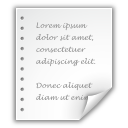This item is
Attribution-NonCommercial-ShareAlike 3.0 Unported (CC BY-NC-SA 3.0)
Publicly Available
and licensed under:Attribution-NonCommercial-ShareAlike 3.0 Unported (CC BY-NC-SA 3.0)
Files for this item
Download all local files for this item (395.62 KB)

- Name
- darwin1842-0632.txt
- Size
- 79.51 KB
- Format
- Text file
- Description
- Version of the work in plain text format
<P 41>
PART 1 ON VARIATION UNDER DOMESTICATION,
AND ON THE PRINCIPLES OF SELECTION
An individual organism placed under new conditions sometimes
varies in a small degree and in very trifling respects such
as stature, fatness, sometimes colour, health, habits in
animals and probably disposition.
Also habits of life develop certain parts.
Disuse atrophies.
When the individual is multiplied for long periods
by buds the variation is yet small, though greater and
occasionally a single bud or individual departs widely from its
type (example) and continues steadily to propagate, by buds, such
new kind.
When the organism is bred for several generations under new
or varying conditions, the variation is greater in amount and
endless in kind.
The nature of the
external conditions tends to effect some definite change in all
or greater part of offspring - little food, small size - certain
foods harmless, etc., organs affected and diseases - extent unknown.
A certain degree of variation (Mulle . . .

- Name
- darwin1844-0632.txt
- Size
- 310.9 KB
- Format
- Text file
- Description
- Version of the work in plain text format
<P 91>
PART 1
CHAPTER 1
ON THE VARIATION OF ORGANIC BEINGS
UNDER DOMESTICATION: AND ON THE PRINCIPLES
OF SELECTION
The most favourable conditions for variation seem to be when organic
beings are bred for many generations under domestication: one may infer
this from the simple fact of the vast number of races and breeds of
almost every plant and animal, which has long been domesticated. Under
certain conditions organic beings even during their individual lives
become slightly altered from their usual form, size, or other characters:
and many of the peculiarities thus acquired are transmitted to their
offspring. Thus in animals, the size and vigour of body, fatness, period
of maturity, habits of body or consensual movements, habits of mind and
temper, are modified or acquired during the life of the individual, and
become inherited. There is reason to believe that when long exercise has
given to certain muscles great development, or disuse has lessened them,
that such development is . . .






